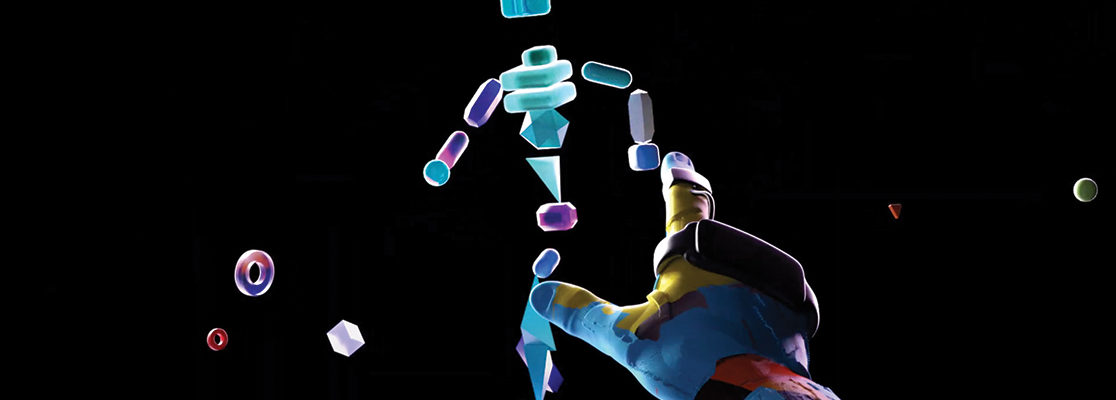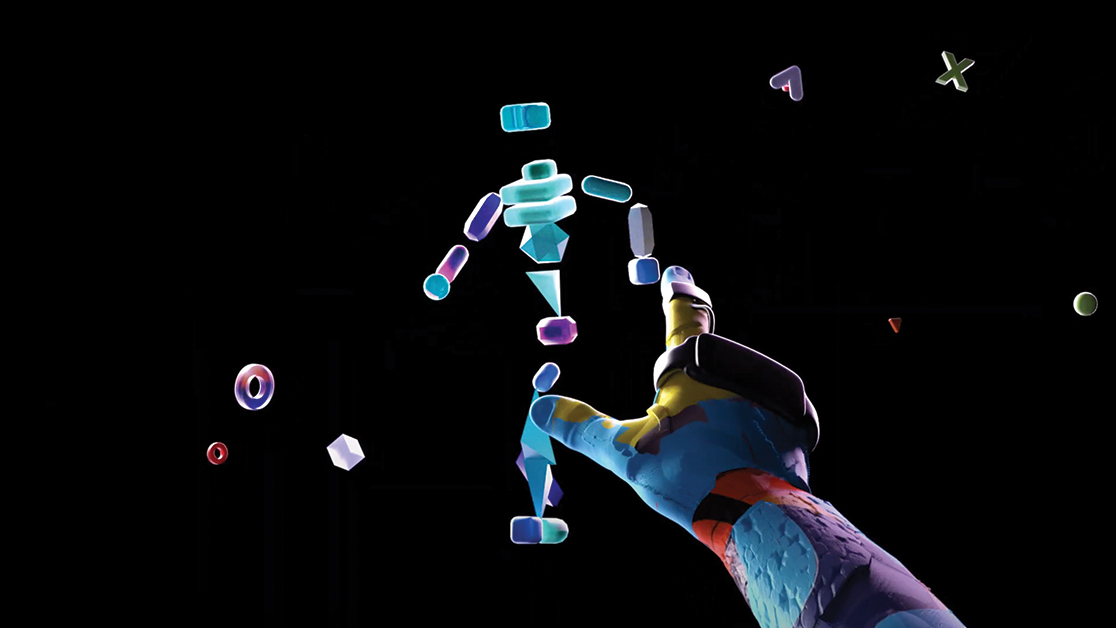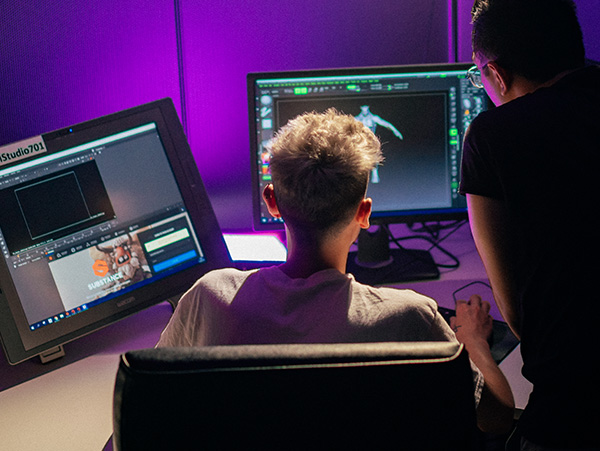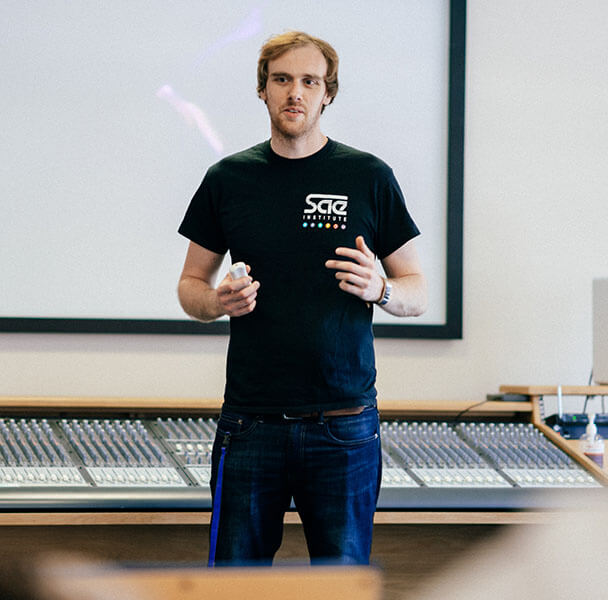BSc (Hons) Games Programming Degree
Unlock your creativity, take your skills to the next level and study games programming at SAE. On our games programming course, you’ll learn the programming and software development techniques that make games work. You’ll also explore topics like games AI, procedural generation, tools development and gameplay programming – all while using the very best industry-standard games development software.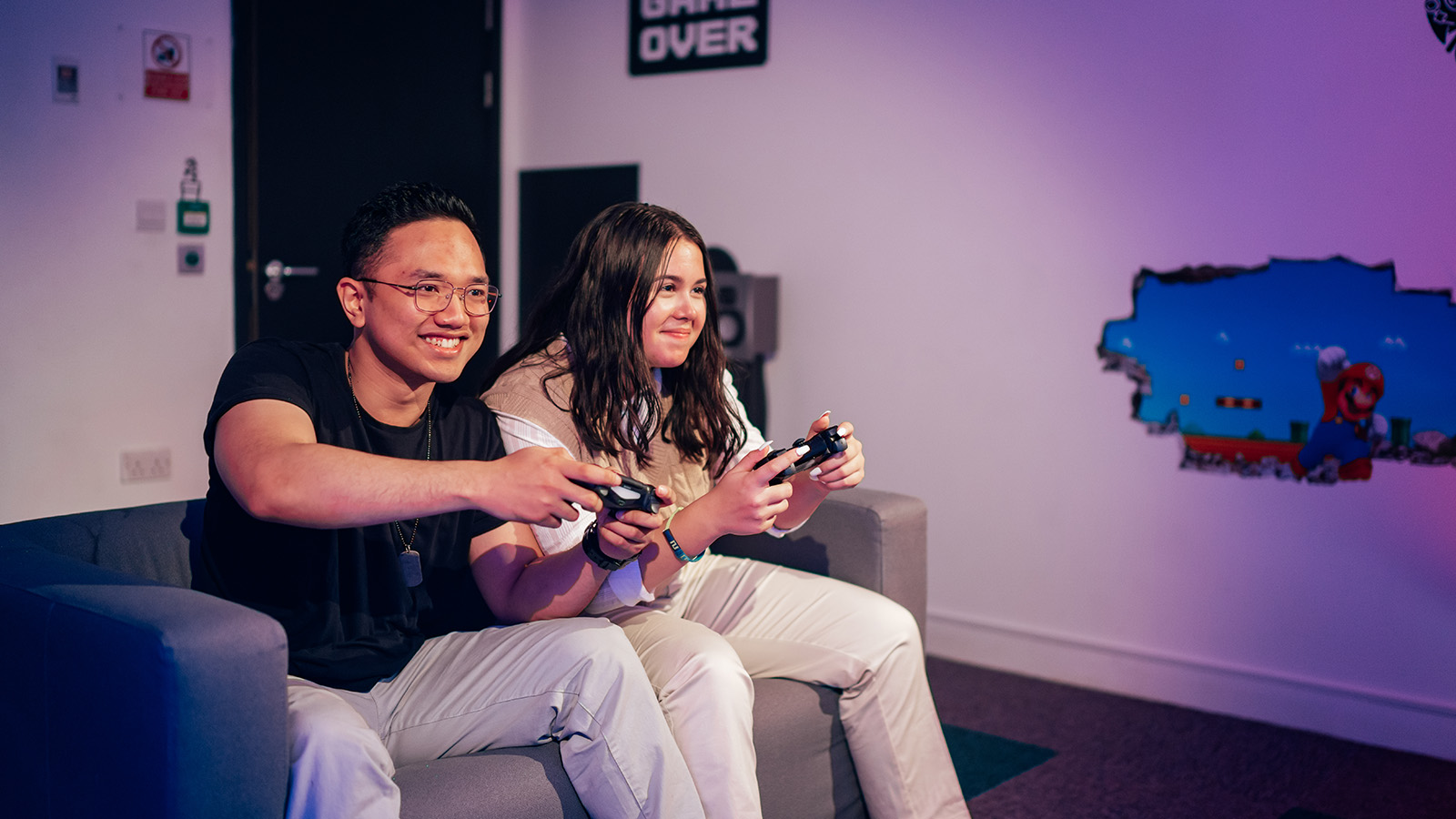
TWO-YEAR ACCELERATED DEGREE:
£11,440 per year
THREE-YEAR DEGREE:
£9,535 per year
The annual tuition fee is fully funded via Student Finance England for eligible home-fee students.
TWO-YEAR ACCELERATED DEGREE:
£9,000 per year
You may also be eligible for a bursary or discount, please enquire with our friendly Admissions Team.
THREE-YEAR DEGREE:
£7,500 per year
You may also be eligible for a bursary or discount, please enquire with our friendly Admissions Team.
TWO-YEAR ACCELERATED DEGREE:
£11,440 per year
THREE-YEAR DEGREE:
£9,535 per year
The annual tuition fee is fully funded via Student Finance England for eligible home-fee students.
TWO-YEAR ACCELERATED DEGREE:
£11,440 per year
THREE-YEAR DEGREE:
£9,535 per year
TWO-YEAR ACCELERATED DEGREE:
£11,440 per year
THREE-YEAR DEGREE:
£9,535 per year
The annual tuition fee is fully funded via Student Finance England for eligible home-fee students.
TWO-YEAR ACCELERATED DEGREE:
International students (non-EU/EEA/Swiss)*: £16,500 per year
EU/EEA/Swiss students*: £12,500 per year
THREE-YEAR DEGREE:
International students (non-EU/EEA/Swiss)*: £15,750 per year
EU/EEA/Swiss students*: £11,250 per year
*Student visa required
For more information regarding SAE’s EU/EEA/Swiss students bursary policy, please read the SAE UK EU Students Bursary Policy.
TWO-YEAR ACCELERATED DEGREE:
International students (non-EU/EEA/Swiss)*: £16,500 per year
EU/EEA/Swiss students*: £12,500 per year
THREE-YEAR DEGREE:
International students (non-EU/EEA/Swiss)*: £15,750 per year
EU/EEA/Swiss students*: £11,250 per year
*Student visa required
For more information regarding SAE’s EU/EEA/Swiss students bursary policy, please read the SAE UK EU Students Bursary Policy.
TWO-YEAR ACCELERATED DEGREE:
International students (non-EU/EEA/Swiss)*: £16,500 per year
EU/EEA/Swiss students*: £12,500 per year
THREE-YEAR DEGREE:
International students (non-EU/EEA/Swiss)*: £15,750 per year
EU/EEA/Swiss students*: £11,250 per year
*Student visa required
For more information regarding SAE’s EU/EEA/Swiss students bursary policy, please read the SAE UK EU Students Bursary Policy.
TWO-YEAR ACCELERATED DEGREE:
International students (non-EU/EEA/Swiss)*: £16,500 per year
EU/EEA/Swiss students*: £12,500 per year
THREE-YEAR DEGREE:
International students (non-EU/EEA/Swiss)*: £15,750 per year
EU/EEA/Swiss students*: £11,250 per year
*Student visa required
For more information regarding SAE’s EU/EEA/Swiss students bursary policy, please read the SAE UK EU Students Bursary Policy.
TWO-YEAR ACCELERATED DEGREE:
International students (non-EU/EEA/Swiss)*: £16,500 per year
EU/EEA/Swiss students*: £12,500 per year
THREE-YEAR DEGREE:
International students (non-EU/EEA/Swiss)*: £15,750 per year
EU/EEA/Swiss students*: £11,250 per year
*Student visa required
For more information regarding SAE’s EU/EEA/Swiss students bursary policy, please read the SAE UK EU Students Bursary Policy.
January and September
January and September
January and September
January and September
September 2025
Offers will be made to applicants who are expected to meet, or exceed the entry requirements below, in addition to supplying a personal statement:
SAE Institute will accept non-standard entry applications, which do not meet the 72 UCAS points or equivalent, and/or maths/English at level 2 or equivalent as required:
Students whose first language is not English will need a qualification that demonstrates competence in English, equivalent to UK GCSE (Level 2) grade 4 (c) or above.
Equivalent qualifications can be accepted, where these qualifications have been verified by ENIC and are adopted widely within the UK Higher Education sector, including:
- Listening – 17
- Writing – 17
- Speaking – 20
- Reading – 18
- International ESOL C1 Expert – pass in all four components
- International ESOL SELT B2 (Listening, Reading, Writing, Speaking) – minimum 33 in all components
- ESOL Integrated Skills in English II – pass in all components
What you can expect from your Games Programming degree
Always wanted to learn to make games as a games programmer? With SAE’s games programming degree, you’ll take part in an immersive learning experience – uniquely tailored to aspiring games programmers. Integrating fundamental theories with hands-on practice, you’ll set yourself up for success as you prepare for a thriving career from the moment you arrive. Available in a 2-year accelerated format or a more standard 3-year option across all SAE campuses, you can select the study calendar that best suits your lifestyle.
Throughout this unique and practical focused games programming course, you’ll refine industry-specific skills, gaining technical expertise and practical proficiency. During your time as an SAE student, you’ll have unlimited access to the industry-standard software in our state-of-the-art computer labs, meaning you’ll gain a good working knowledge of software programmes like Unreal Engine 5, Unity3D, Visual Studio and Maya, and programming languages C++ and C#.
In addition to mastering programming techniques, you’ll gain vital project management skills, refine your academic writing abilities, and learn how to problem-solve effectively to ensure optimal project results. Over the course of your game programming degree, you’ll also benefit from the mentorship of SAE’s experts, who are all seasoned professionals in the industry with a vast amount of knowledge to share.
Levelling up
As part of your degree in games programming, you’ll work with your fellow games programme degree students, as well as those in other creative disciplines such as music, film and animation, on a range of projects that mirror real-world scenarios. This will build your teamwork skills, enrich your professional portfolio and provide you with an extensive network of creatives to stay in touch with after graduation.
At the end of your studies, you’ll have gained essential knowledge across game engines, mechanics and mechanisms and will be well versed in design principles, composition algorithms, artificial intelligence and many other industry-relevant topics. So, whether your dream is to become a game designer, analyst, programmer or writer, it’s definitely game on at SAE.

What you'll learn
- Gain key knowledge and skills in game programming, forming a solid foundation for your future studies and career.
- Learn programming languages C++ and C#.
- Confidently operate the latest industry software, including 3ds Max, Unreal Engine 5, Maya and Unity3D.
- Design your own game world, NPCs, levels and content using common engines.
- Understand professional workflows for environment creation and real-time games programming.
- Collaborate on original projects with peers from other creative disciplines, such as animation, film and audio.
- Develop a significant portfolio of work to present to industry.
- Build a network of peers and professionals across the creative industries.
- Graduate career-ready with a degree in games programming from a recognised creative institute.
- Games programming course start dates available in January and September.
YOUR CAREER IN GAMES BEGINS NOW
What your course structure will look like
The BA/BSc (Hons) Games Programming degree can be studied as either an accelerated games programme degree course that takes place over 2 years and 6 trimesters, or a more conventional one across 3 years and 6 semesters. It is structured over 3 distinct stages – each created to help you gain a number of specific skills. Splitting it up this way means you graduate as a well-rounded games programmer with an extensive understanding of the whole game development process.• Stage 1 (T1/S1 and T2/S2) provides a foundation of core technical knowledge.
• Stage 2 (T3/S3 and T4/S4) broadens your skills by creating collaborative game projects, and exploring new areas of games programming.
• Stage 3 (T5/S5 and T6/S6) is all-encompassing, covering every aspect of games development from conception to completion, including entrepreneurial aspects like project management, finance and business skills.
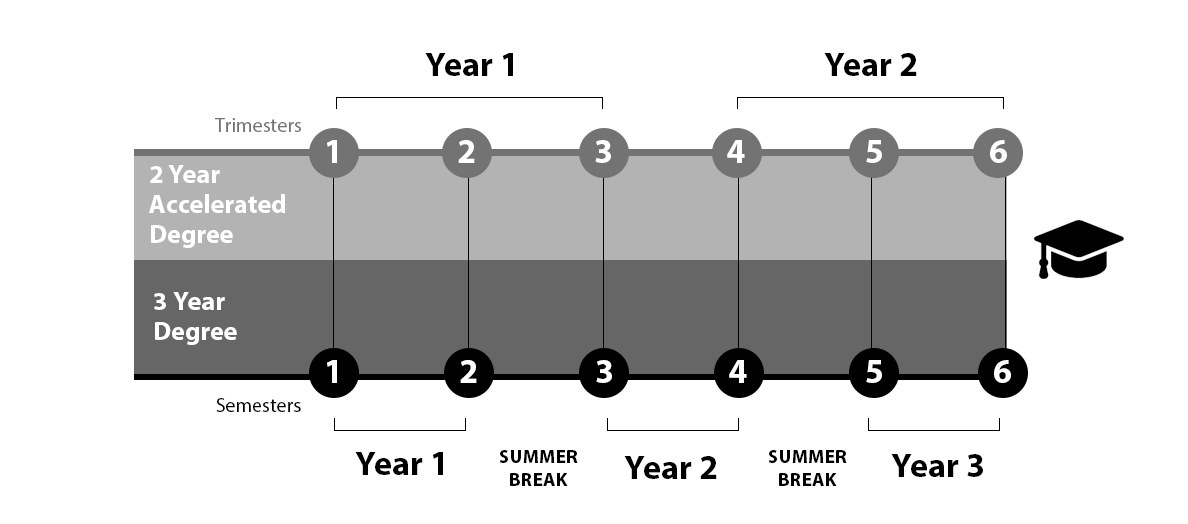
Topics include:
- Programming Basics
- Structured Programming
- Object-Oriented Programming
- Introduction to Algorithms
- Boolean Algebra And Numeral Systems
- Vector Arithmetic
- Version Control
Topics include:
- Game Design Fundamentals
- Game Engine Basics
- Game Mechanics
- Game Mechanisms
Topics include:
- Design Patterns
- Data Structures
- Software Architecture
- Copyright Basics
- Game Production Basics
- Optimisation (Profiling)
Topics include:
- Statistics
- Heuristics
- AI Fundamentals
- Pathfinding
- Behaviour Trees
- Finite State Machines
- Composition Algorithms, e.g.
- Maze, Dungeon and Landscape Composition Algorithms
Topics may include:
- Level Design
- Computer Graphics
- Shader Programming
- Lighting
- Animation Programming (IK, FK)
- PCG Advanced (L System, Generative Algorithms)
- Persistent Data
Topics may include:
- VR/AR development
- Specific Platform Development
- Mobile Development
- Performance Optimisations
- Multithreading
- Performance Analysis
- Business Planning
- Marketing
Topics may include:
- Machine Learning
- AI Advanced (GOAP, Utility AI)
- ECS
- Compute Shaders
- VR/AR Development
- Physics
WHY STUDY GAMES PROGRAMMING AT SAE?

Accelerated learning
Choose to enter the industry more quickly with our game design accelerated degree – completed in 2 rather than 3 years – and also save on tuition fees and living expenses. Or you might prefer to complete your studies across a more usual 3-year period so you can make the most of your university summer break.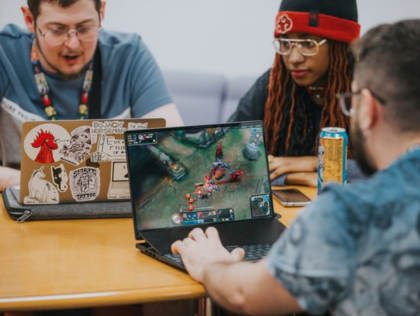
Creative collaboration
Engage in collaborative projects with your games programming course peers, as well as SAE students from other creative disciplines.
Career Outcomes
What Jobs will this course lead to?
- Games Programmer
- Level Designer
- Simulation Programmer
- Systems Designer
- Graphics Programmer
- Tools Programmer
- User Interface Programmer
- Playtester
- QA Tester
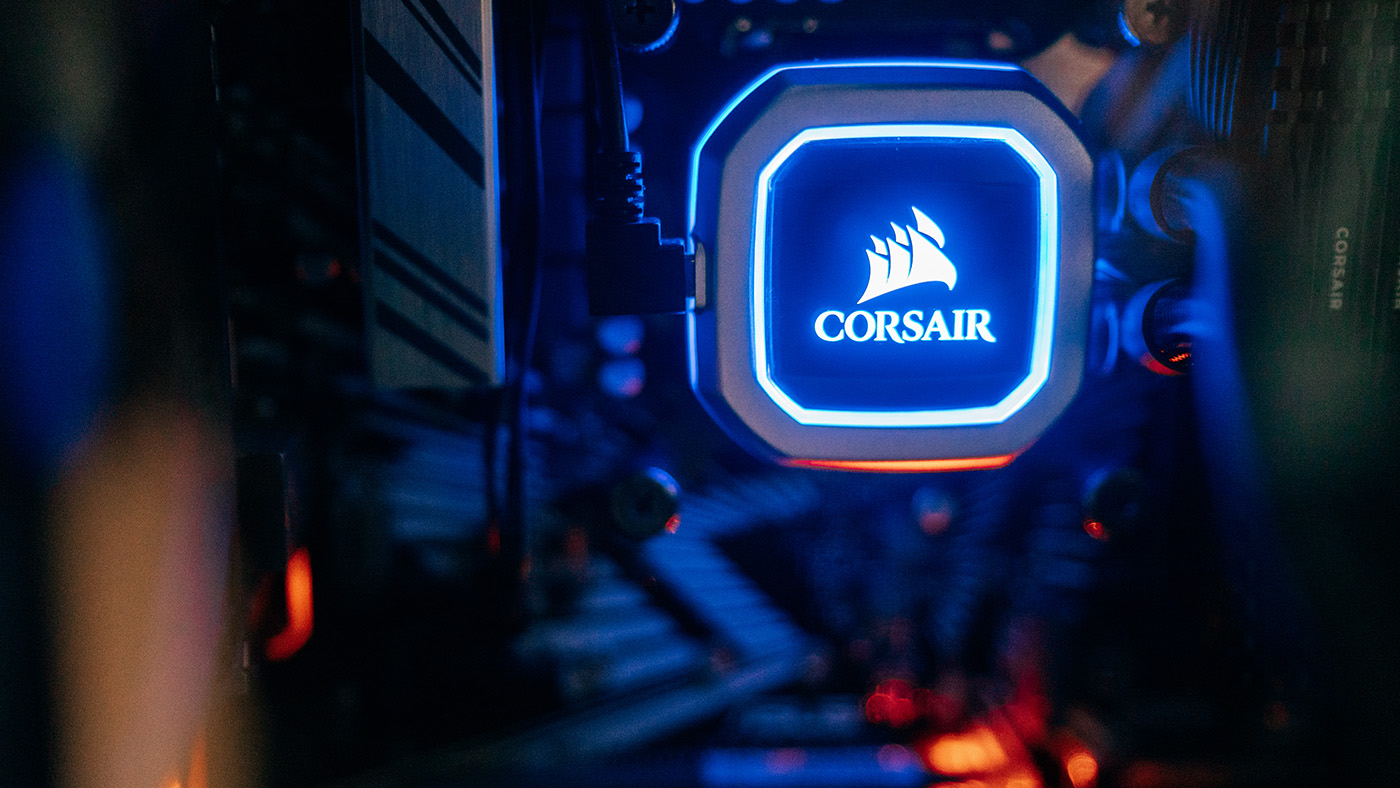
YOUR DREAM CAREER BEGINS NOW
With our industry connections, specialised teachers and personalised education in world-class facilities, you can unleash your creative future with a Games Programming degree.
Course FAQs
We will use a wide range of tools and software including Unity Engine (2D and 3D), Direct X / Open GL, Blender, C# programming language, Photoshop, Illustrator and Visual Studio.
Yes, you will learn how to design and develop Multiplayer Games using network programming, client-server communication and file I/O.
Yes, we are excited to teach our students the latest technologies such as AI to create an effective immersive experience for the player.





